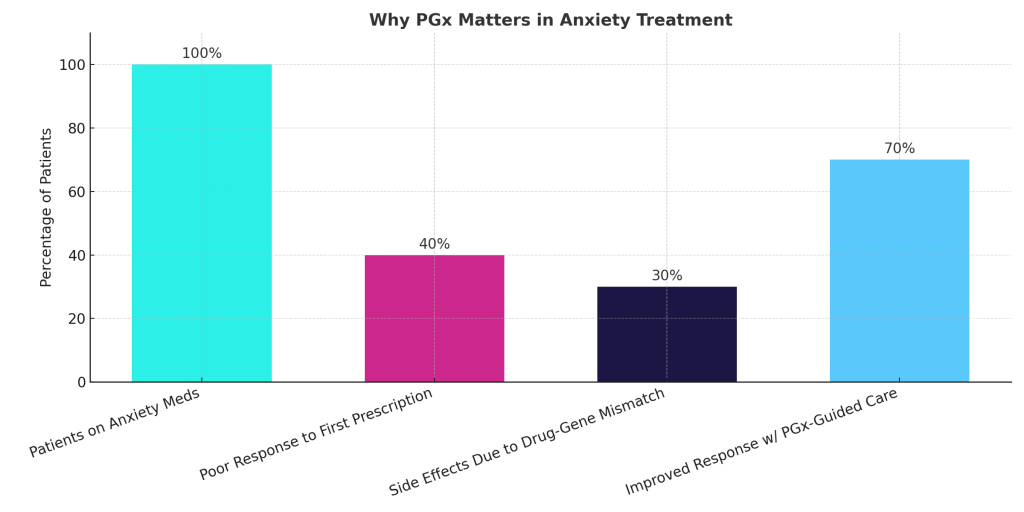
Getting It Right the First Time
Anxiety affects more than 40 million adults in the United States, and for many, medication becomes a critical part of treatment. But finding the right prescription often means trial and error. Some medications bring no relief. Others cause side effects that feel worse than the anxiety itself.
That cycle can take weeks, months, or even years to resolve. But now, pharmacogenetic (PGx) testing is giving patients and providers a head start by identifying how the body is likely to respond to specific anxiety medications.
At BloomDNA®, we specialize in this testing to help eliminate the guesswork. For people like Taylor, it’s been a breakthrough.
Taylor’s Story: From Frustration to Relief
Taylor, a 32-year-old professional, had been managing anxiety since college. Over the years, she tried five different medications. One caused severe fatigue. Another made her feel emotionally numb. Two didn’t seem to work at all. Each new prescription came with a waiting period and growing frustration.
Her provider recommended BloomDNA® pharmacogenetic testing before trying a sixth medication. The results showed that Taylor had a genetic variant in CYP2C19, which affected how her body processed SSRIs. The medication she had been prescribed most often was likely being metabolized too quickly to take full effect.
Armed with this insight, her provider selected a different medication and adjusted the dose. Within a few weeks, Taylor noticed a marked improvement. Her anxiety became more manageable, and the side effects were minimal.
Why Pharmacogenetic Testing Works
Pharmacogenetic testing looks at your genetic blueprint to understand how your body metabolizes medications. For anxiety, this means evaluating the pathways and enzymes that process SSRIs, SNRIs, and other anti-anxiety treatments.
At BloomDNA®, we test markers such as:
CYP2C19 – Influences metabolism of medications like escitalopram and citalopram
CYP2D6 – Affects how sertraline and certain SNRIs are processed
SLC6A4 – Related to serotonin transporter function, which can shape how effectively SSRIs work
By identifying how these genes function in your system, your provider can make better decisions about which medications to try, what doses to use, and what to avoid.

Data Illustrated:
- 100%: Patients prescribed anxiety medication
- 40%: Do not respond to the first medication
- 30%: Experience side effects due to gene-drug mismatch
- 70%: Show improved outcomes with PGx-informed care
Saving Time and Reducing Harm
The traditional approach to anxiety medication often relies on educated trial and error. A doctor starts with a commonly prescribed option, adjusts if it doesn’t help, and tries again. That process can lead to unnecessary suffering and lost time.
With BloomDNA®, that cycle can be shortened. Our test delivers a clear report with:
Medication guidance based on your genetic profile
Flags for drugs that may be poorly metabolized or cause more side effects
A tool your provider can use to plan a treatment strategy with fewer delays
This approach does not replace clinical care. It strengthens it with personalized science.
What You Receive With BloomDNA®
Our test is:
Processed in a U.S.-based certified lab
Reviewed for accuracy by clinical experts
Designed to assess over 300 medications
Structured to support both patient clarity and provider decision-making
Whether you are starting treatment for the first time or revisiting options after failed attempts, pharmacogenetic testing can offer insight that moves you forward.
Start With Your DNA, Not With Guesswork
Anxiety treatment should be built around you. BloomDNA® helps providers match the right medications to the right person based on the way your body works. No more starting from scratch. No more unnecessary side effects. Just clearer direction.
Learn how BloomDNA® can guide anxiety treatment. Start here.
References
McGowan OO
Pharmacogenetics of anxiety disorders
https://pubmed.ncbi.nlm.nih.gov/31442515/%20PubMed
A review summarizing pharmacogenetic findings related to treatment response in anxiety disorders.
Scherf‑Clavel M
The role of pharmacogenetics in the treatment of anxiety
https://www.tandfonline.com/doi/full/10.1080/17425255.2021.1991912?utm_source=chatgpt.com
This review covers pharmacokinetic and pharmacodynamic gene influences in anxiety and related disorders.
Aldrich SL
Influence of CYP2C19 Metabolizer Status on Escitalopram Response in Anxiety/Depression
https://www.frontiersin.org/journals/pharmacology/articles/10.3389/fphar.2019.00099/full Frontiers
This pediatric/adolescent study shows that CYP2C19 metabolizer status influenced response, tolerability, and side effects in anxiety/depression patients.
Zastrozhin MS
CYP2C1917 Polymorphism and Escitalopram Efficacy/Safety
https://pmc.ncbi.nlm.nih.gov/articles/PMC9235311/ PMC
Demonstrates that a CYP2C19 variant (*17) influences how patients respond to escitalopram, with implications for dose or drug choice.

